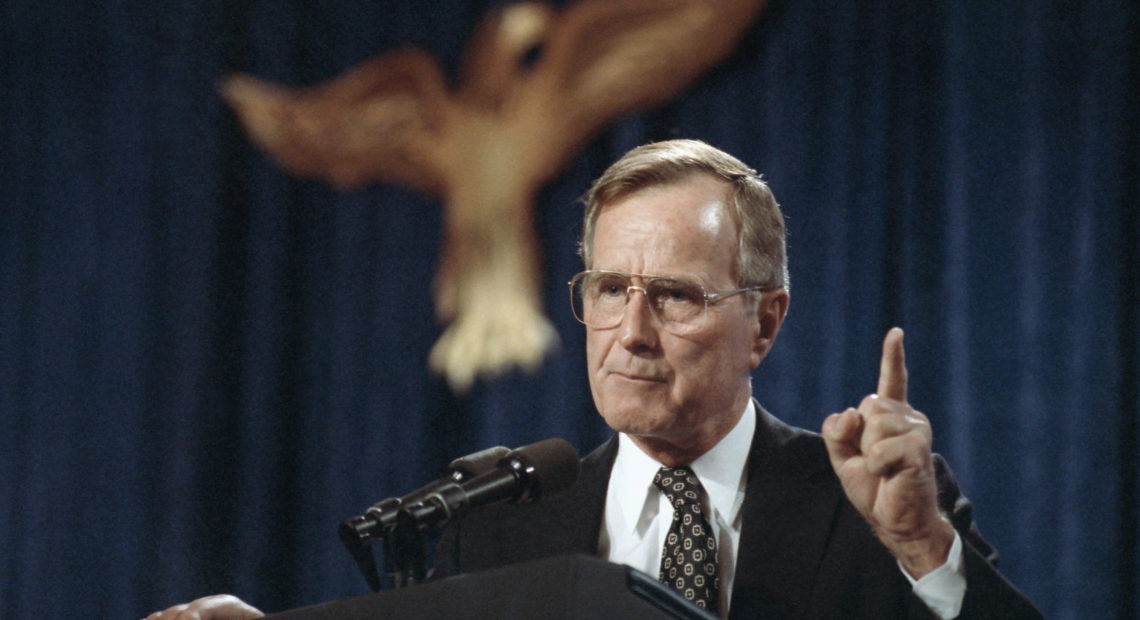
Former President George H.W. Bush Dies At 94, 7 Months After Death Of Wife Barbara
Read On
PHOTO: George H.W. Bush, the 41st president of the United States, speaks at a fundraiser in Dallas in 1991. CREDIT: Marcy Nighswander/AP
BY SCOTT HORSLEY & MARCUS ROSENBAUM, NPR
George H.W. Bush was the definition of establishment success: Yale graduate. Prosperous business career. Forty-first president of the United States.
But to one admittedly biased observer, the elder Bush has always been shortchanged.
“As a result of him being a one-term president, historians hadn’t paid much attention to him,” George W. Bush told NPR in a 2014 interview. He called his father “one of the greatest one-term presidents in the nation’s history.”
George Herbert Walker Bush died Friday at the age of 94. He had been hospitalized for low blood pressure and fatigue in May, a week after arriving in Maine to spend the summer.
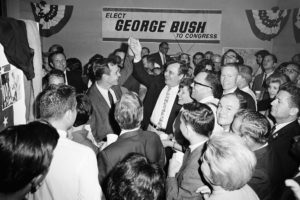
Bush, left, celebrates after winning the U.S. House seat for Texas’ 7th District in 1966. CREDIT: Ed Kolenovsky/AP
There were fears that after his wife, Barbara, died in April, Bush might die, too. He was admitted to the hospital with a blood infection on April 23, one day after the funeral for the former first lady, and remained there for 13 days.
He was hospitalized again in May for low blood pressure and fatigue a week after arriving in Maine to spend the summer. He was released a few days later and celebrated his birthday on June 12 — making history by becoming the first former president to reach the age of 94.
Bush was the patriarch of a political dynasty that included one son who served as president, another as a governor and a grandson who currently holds statewide office in Texas.
The senior Bush had a lifetime of public service before he became president — as a young Navy pilot in World War II, Texas congressman, CIA director and faithful vice president to Ronald Reagan.
“His loyalty to Ronald Reagan was legendary,” said biographer Timothy Naftali. “He did not always agree with Ronald Reagan. And he was so secretive about those moments where he disagreed, we don’t even have good documentation — at least not available yet — on when he disagreed.”
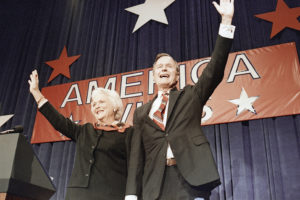
Bush and his wife, Barbara, wave at a victory party after he beat Democrat Michael Dukakis in the 1988 presidential election. CREDIT: J. Scott Applewhite/AP
Bush famously disagreed with Reagan when he ran against him in the Republican primary of 1980. Bush branded Reagan’s supply-side faith that government could slash tax rates without losing revenue as “voodoo economic policy.”
History would prove that assessment right. Reagan later had to reverse some of his tax cuts in the face of mounting deficits. But by the time Bush ran to succeed Reagan, he knew what it took to win the confidence of conservative Republicans.
“Read my lips,” Bush pledged at the 1988 GOP convention. “No new taxes.”
Bush trounced Democrat Michael Dukakis that year to win the White House. But he ultimately backtracked on his lip-reading promise. During 1990 budget negotiations with Democratic congressional leaders, Bush, like Reagan before him, agreed to a tax increase.
His press secretary, Marlin Fitzwater, recalled a budget meeting where the deal was presented.
“The minute I saw it, I looked around the table and the Democrats looked like the cat who ate the canary,” Fitzwater said. “They knew they had negotiated a winner.”
The tax hike cut the deficit, but it cost Bush dearly with conservatives. Years later, he would receive a Profile in Courage award from John F. Kennedy’s grandson, who said, “America’s gain was President Bush’s loss.”
Bush’s most notable accomplishments in the White House came in the area of foreign policy. While Reagan is often credited with winning the Cold War, it was Bush who successfully navigated the aftermath. His low-key approach avoided inflaming communist hard-liners and allowed for the peaceful breakup of the Soviet Union.
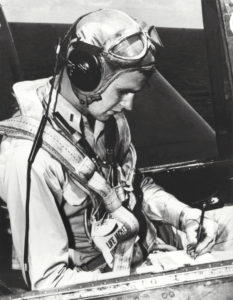
Bush served in the U.S. Navy from 1943-1945. He was the youngest pilot in the Navy during World War II. CREDIT: AFP/GETTY IMAGES
“The soft landing that occurred, which was not inevitable, is in large measure due to George H.W. Bush’s diplomacy,” said Naftali.
Bush, who served as U.S. envoy to China as well as a globe-trotting vice president, had a thick Rolodex and plenty of experience working the phones. His lifetime of foreign contacts also came in handy when Iraqi troops invaded Kuwait in 1990. Bush methodically assembled an international coalition to push them back.
A five-week bombing campaign was followed by a 100-hour ground assault that routed the Iraqis from Kuwait. Some wanted allied troops to push on to Baghdad and topple Saddam Hussein. But Bush said no.
“The president’s decision was we are not going on to Baghdad,” the late diplomat Lawrence Eagleburger recalled. “If we do, we will have violated the agreement we have with our allies, which was to bring Saddam out of Kuwait. It was not to bring Saddam down. And in addition, it will tie us into an area where we cannot be sure how soon we can withdraw.”
Bush’s son George W. would revisit that decision a dozen years later, with costly results.
The first Gulf War was a clear victory for U.S. forces. As commander in chief, George H.W. Bush saw his approval ratings soar to nearly 90 percent. His lock on a second term seemed so solid, many national Democrats opted to sit out the 1992 election, leaving it to the governor of a small Southern state to challenge him.
Bill Clinton had one big advantage, though: the economy, stupid. As the country sank into recession, Bush’s popularity sank with it. There was no parachute or soft landing this time. He lost a three-way race in the November election, carrying just 38 percent of the vote.
More than two decades later, George W. Bush, who experienced his own roller coaster ride in the polls, wrote an affectionate portrait of his father, titled 41.
“I want people to better appreciate George Bush, as not only a great person but a very successful president,” the younger Bush said.
Bush was also the linchpin of a political dynasty that now spans four generations — including a second son, former Florida Gov. Jeb Bush, who ran for the White House and lost in the 2016 Republican primaries as Donald Trump became the dominant force in a GOP that had evolved far from where it was when the 41st president was in office.
Whatever the senior Bush’s political shortcomings, hindsight has cast his presidency in a kinder, gentler light.
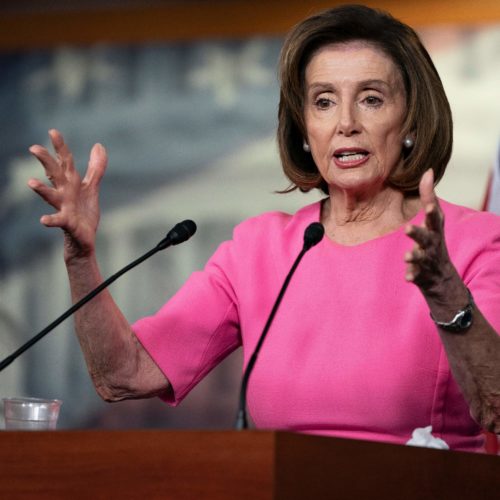
White House Eyes Piecemeal Pandemic Aid After President Trump Ends Talks On Overall Package
hite House chief of staff Mark Meadows said Wednesday that he and Treasury Secretary Steven Mnuchin are discussing potential stand-alone bills for aid to airlines, small businesses and Americans. He said the Trump administration was “still willing to be engaged” on piecemeal aid bills, though it was not optimistic about a comprehensive aid bill.

Unpublicized White House Report Has States Including Washington And Idaho In COVID ‘Red Zone’
A document prepared for the White House Coronavirus Task Force but not publicized suggests more than a dozen states, including Idaho and Washington, should revert to more stringent protective measures, limiting social gatherings to 10 people or fewer, closing bars and gyms and asking residents to wear masks at all times.
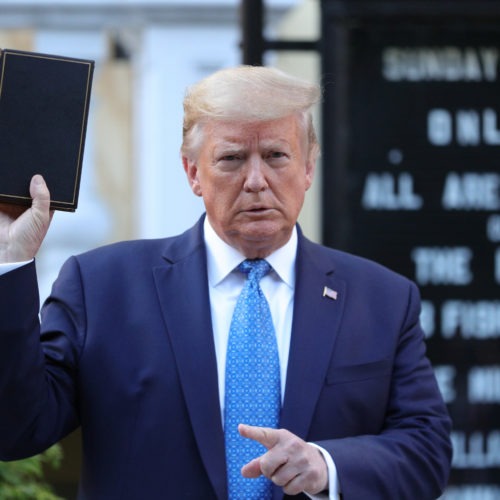
‘He Did Not Pray’: Fallout Grows From President Trump’s Photo-Op At St. John’s Church
“He did not pray. He did not offer a word of balm or condolence to those who are grieving,” says the bishop who oversees the church. Washington’s mayor was more direct: “Shameful!”















